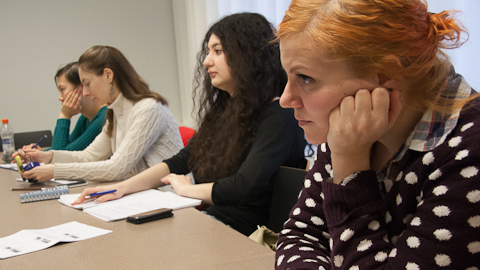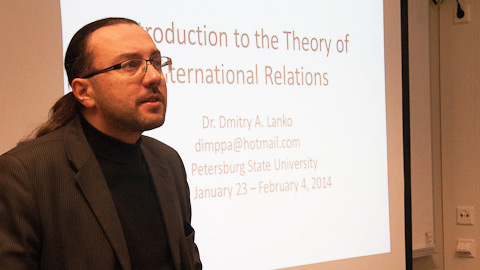Finnish Russian Student Exchange (FIRST) is CIMO’s exchange programme that promotes networking between universities in Russia and Finland. It funds teacher and student mobility and organises intensive courses.
Mrs Tarja Hyppönen,the Programme Coordinator of Baltic Sea Region Studies (BSRS) in the University of Turku, sees FIRST as a great opportunity to get top-researchers to teach in Turku. Associate Professor Dmitry Lanko from St. Petersburg State University is giving a seminar for the third time in University of Turku. His cooperation with the Baltic Sea Region Studies has proved to be productive.
– As we have limited resources, inviting high level experts is one way to provide excellent education to our students. Professor Lanko ‘s expertise in the theories of international relations is really valuable for us, Tarja Hyppönen says.
Many Reasons for Visiting Lecturers
Lankos sees many reasons why the cooperation between universities is important. One is the globalisation of education. During the Cold War, Russian universities used to teach international relations to future Russian diplomats, American universities used to train their own, and so did Finland. Today, most of the students at BSRS are international.
– It is also quality assurance. My students in St. Petersburg have professors from abroad and they can compare my lectures with the lectures of foreign professors. That makes me do my best in order to make my lectures even better than the lectures of the invited foreign professors. Thus, the overall quality of teaching goes up, Lanko says.
Lanko also points out that teaching and research goes hand-in-hand.
– What is important about contemporary research is that good research is more often done by a group of scholars, not by one researcher. When we travel abroad for teaching purposes, we also create the basis for future research groups
The Exam before the Seminar
The structure of Lankos seminar is quite unique. Before the seminar, all the attendees will read and take an exam on the material Lanko has chosen for them. He sees the impact of the pre-exam on the class atmosphere and teaching.
– On the one hand, it is good that students familiarise themselves with background reading in the subject. I do not have to speak about the basics in class, but I can instead go deeper into the subject. On the other hand, if I learn from the students' pre-exam papers that students had failed to understand some important concepts mentioned in the literature, I reserve more time to discuss those particular concepts in class in order to achieve a better understanding, Lanko says.
Regina Melkumian, a student from Russia, admits that she was surprised by the unusual and challenging pre-exam.
– At the beginning of the course, my main question was “Can I pass the pre-exam successfully without any previous lectures?” I cannot say that it was an easy task to read articles about the subject you had never studied before, Melkumian says.
She found out that the lack of background knowledge in this subject and the compulsory task to read articles before the course inspired her to find answers to her questions either by reading or later by asking the lecturer. It ended up in the situation where she read a lot of additional books and articles devoted to the subject, which enhanced her knowledge about the theories on international relations.
– This knowledge helped me to comprehend the following lectures, formulate the main questions and bring them to the lector's focus later, Melkumian says.
 The Baltic Sea Region Studies programme offers two tracks of studies: a two-year international Master’s Programme as well as non-degree studies for exchange students and Finnish degree students at the University of Turku. Riika Räisänen (right), Regina Melkumian, Marina Andreyanovna and Julia Matveeva and the whole seminargroup have an excellent overall understanding about international relations due to the course of Associate Professor Lanko.
The Baltic Sea Region Studies programme offers two tracks of studies: a two-year international Master’s Programme as well as non-degree studies for exchange students and Finnish degree students at the University of Turku. Riika Räisänen (right), Regina Melkumian, Marina Andreyanovna and Julia Matveeva and the whole seminargroup have an excellent overall understanding about international relations due to the course of Associate Professor Lanko. Based on the final exam, the impact can also be seen on the quality of teaching. After both seminars, the students performed very well in their final exam.
An Extremely Difficult Topic in an Understandable Way
One of the participants, Lithuanian Igne Stalmokaite admits that when you are reading articles from the international relations field, it won't take a long time to get confused with many unclear concepts, theories and etc. Maybe that is why she really enjoyed Lankos’ way to teach.
– He is one of the professors who are gifted with the talent of presenting the most difficult things in an easy manner and one who encourages students to think and adapt the things we have learned in many different environments. Moreover, he is a very good expert in his field, Stalmokaite says.
One argument for the cooperation between universities is a chance to give an excellent education and save money at the same time.
– Universities cannot hire specialists in all the sub-fields of all the disciplines. If students want to attend classes by specialists in a sub-field that does not have representatives in their home university, they have to travel abroad. Or foreign lecturers can be invited to teach a course, Lanko says.
Excellent teaching is an advantage to the university. A participant in the course, Regina Melkumian, chose the University of Turku because it is well-known because of the high quality of its education. Lanko’s course was one example of that.
– Professor Lanko did not only give us general information about the theories of international relations but also made them clearer by providing a detailed explanation, demonstrating them in simple and well-known, real-life examples. He also encouraged us to do the same thing, Melkumian tells.
She admits that before the course, the subject “International Relations” was something incomprehensible to her.
– Nowadays, due to this course and Mr Lanko's original way of bringing the material to the class, I have a solid background in this subject.
Text and photos: Erja Hyytiäinen
Translation: Mari Ratia

